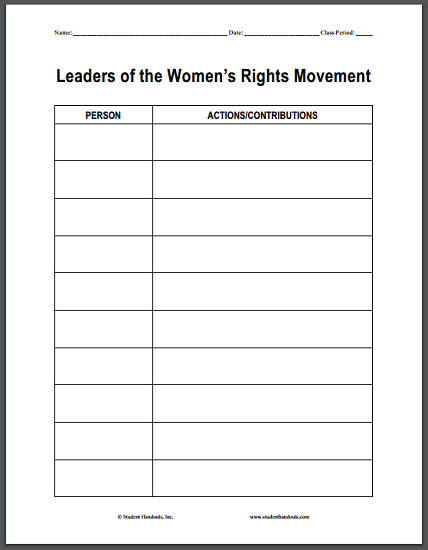| Leaders of the Women's Rights Movement DIY Blank Chart |
|---|
| www.studenthandouts.com > U.S. History > Decades of Change > Worksheets |
 |
|---|
| Students complete this worksheet by listing the names of leaders in the movement for women's rights, alongside their contributions. Teachers are free to craft this to suit the women they have covered in class--such as Angela Davis and Gloria Steinem. Click here to print (PDF file). |
|---|
|
The U.S. women's rights movement of the 1960s, 1970s, and 1980s, saw the emergence of several influential leaders who championed gender equality and women's liberation. Here are some of the key figures. Betty Friedan: Author of The Feminine Mystique (1963), Friedan ignited the second-wave feminist movement by challenging the traditional roles of women in society. She co-founded the National Organization for Women (NOW) in 1966 and served as its first president, advocating for equal rights, workplace equality, and reproductive freedom. Gloria Steinem: A prominent journalist and social activist, Steinem co-founded Ms. Magazine in 1972, providing a platform for feminist voices. She was a key organizer of the Women's Strike for Equality in 1970 and co-founded several organizations, including the Women's Action Alliance and the National Women's Political Caucus, promoting gender equality and women's political participation. Shirley Chisholm: The first African American woman elected to the U.S. Congress in 1968, Chisholm was a trailblazer for women of color in politics. She co-founded the National Women's Political Caucus in 1971 and ran for the Democratic presidential nomination in 1972, advocating for social justice, civil rights, and gender equality. Bella Abzug: A lawyer, U.S. Congresswoman, and feminist leader, Abzug was known for her outspoken advocacy for women's rights, civil rights, and environmental issues. She co-founded the National Women's Political Caucus and played a significant role in pushing for the Equal Rights Amendment (ERA) and the creation of the Women's Environment and Development Organization (WEDO). Germaine Greer: An Australian-born writer and scholar, Greer gained international recognition with her book The Female Eunuch (1970), which became a key text in feminist literature. She critiqued traditional gender roles and called for sexual liberation and women's empowerment. Wilma Mankiller: The first female chief of the Cherokee Nation, Mankiller was a strong advocate for Native American and women's rights. Her leadership in the 1980s and 1990s brought significant improvements to the Cherokee community and inspired indigenous women across the country. Angela Davis: An activist, scholar, and member of the Black Panther Party and the Communist Party USA, Davis was a vocal advocate for civil rights, prison reform, and gender equality. Her work highlighted the intersections of race, class, and gender oppression. These leaders, among others, played pivotal roles in advancing women's rights during a transformative period in U.S. history, shaping the feminist movement and advocating for comprehensive social, political, and economic changes. |
| www.studenthandouts.com > U.S. History > Decades of Change > Worksheets |










